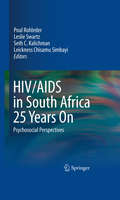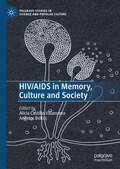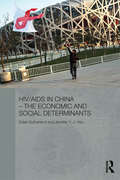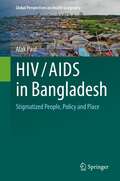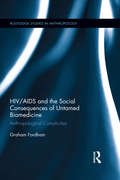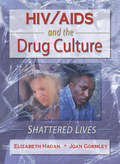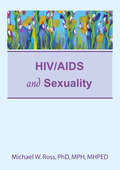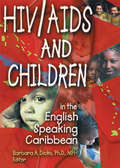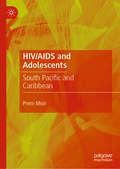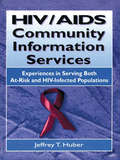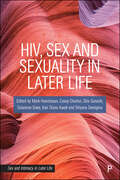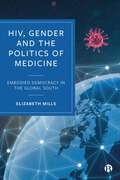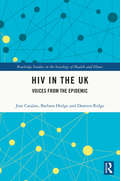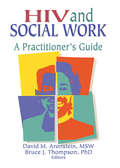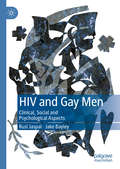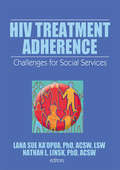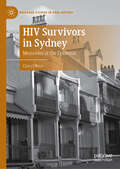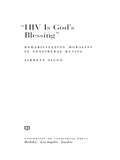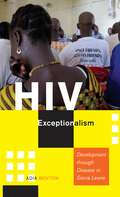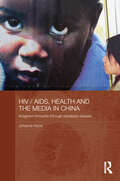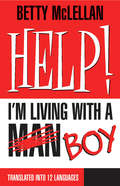- Table View
- List View
HIV/AIDS in South Africa 25 Years On
by Leslie Swartz Seth C. Kalichman Poul Rohleder E. Cameron Leickness Chisamu SimbayiMuch has happened since the first appearance of AIDS in 1981: it has been identified, studied, and occasionally denied. The virus has shifted host populations and spread globally. Medicine, the social sciences, and world governments have joined forces to combat and prevent the disease. And South Africa has emerged as ground zero for the pandemic. The editors of HIV/AIDS in South Africa 25 Years On present the South African crisis as a template for addressing the myriad issues surrounding the epidemic worldwide, as the book brings together a widely scattered body of literature, analyzes psychosocial and sexual aspects contributing to HIV transmission and prevention, and delves into complex intersections of race, gender, class, and politics. Including largely overlooked populations and issues (e.g., prisoners, persons with disabilities, stigma), as well as challenges shaping future research and policy, the contributors approach their topics with rare depth, meticulous research, carefully drawn conclusions, and profound compassion. Among the topics covered: The relationship between HIV and poverty, starting from the question, "Which is the determinant and which is the consequence?"Epidemiology of HIV among women and men: concepts of femininity and masculinity, and gender inequities as they affect HIV risk; gender-specific prevention and intervention strategies. The impact of AIDS on infants and young children: risk and protective factors; care of children by HIV-positive mothers; HIV-infected children.Current prevention and treatment projects, including local-level responses, community-based work, and VCT (voluntary counseling and testing) programs.New directions: promoting circumcision, vaccine trials, "positive prevention."South Africa's history of AIDS denialism.The urgent lessons in this book apply both globally and locally, making HIV/AIDS in South Africa 25 Years On uniquely instructive and useful for professionals working in HIV/AIDS and global public health.
HIV/AIDS in Memory, Culture and Society (Palgrave Studies in Science and Popular Culture)
by Alicia Castillo Villanueva Angelos BollasThis volume examines the role of culture in developing social, cultural and political discourses of HIV/AIDS from a contemporary viewpoint. In doing so, the memory of HIV/AIDS is a powerful tool to examine representations of the past and connect them with future debates. This reassessment of HIV/AIDS explores the most appropriate way to come to terms with a past that involved a negative, stigmatised and marginalised representation. Therefore, remembering plays a key role in generating collective memory, which allows for the exchange of mnemonic content between individual minds, creates discourses on memory and commemoration, and disseminates versions of the past that may affect the representation of HIV/AIDS in the future. Indeed, rewriting about the past also means assessing our responsibility towards the present and the potential of transmission to future generations, especially in times of pandemics.
HIV/AIDS in India: Voices from the Margins (Routledge Research on Gender in Asia Series)
by Sunita ManianIndia ranks third in the number of people living with HIV/AIDS globally. The country has high levels of poverty and inequality, poor healthcare infrastructure, especially away from the metropolitan areas, and a legacy of colonialism that bequeathed laws criminalizing non-heteronormative sexualities. These factors mean that many minority groups do not receive adequate access to preventative and treatment programs. This book explores the HIV/AIDS epidemic in India. Based on research in Tamil Nadu, it presents experiences of those marginalized by their sexuality and/ or gender, their struggles and their triumphs. Based on interviews with male and female sex-workers, men who have sex with men, aravanis (male to female transgenders) and HIV positive women—groups usually not included in the policy-making by Indian government agencies, international donors and international NGOs—the author uses an interdisciplinary approach. The approach highlights the historical and cultural context, while providing contemporary narratives. The book thus presents a deeper, multi-dimensional, understanding of the context of the disease and comprehends the roots of the stigma and discrimination that exacerbate the epidemic. An important study of the global HIV/AIDS epidemic, this book will be of interest to researchers in the field of South Asian Studies, Sexuality and Gender Studies, Health Sciences and Public Health.
HIV/AIDS in China - The Economic and Social Determinants: The Economic And Social Determinants (Routledge Contemporary China Series)
by Jennifer Y.J. Hsu Dylan SutherlandSouth and East Asia may well become the epicentres of the global HIV/AIDS pandemic. More than three-quarters of a million people are now estimated to be living with HIV/AIDS in China. In 2009, AIDS had already become the leading cause of death by infectious disease. Yet, even despite China’s recent economic and social progress, a number of development issues - not least the emergence of glaring inequalities - have also emerged. The expansion of the HIV/AIDS epidemic is also an important longer term development challenge. This book analyses China’s HIV/AIDS epidemic, with particular attention to the nature and impact of current economic and social changes and how these changes may be driving the epidemic. It examines aspects of income and gender inequality; rural-urban migration; commercial sex work; healthcare and civil society organizations. Health care reforms and the role of NGOs are also considered as well as general government policy. Overall, this book provides a full discussion of the most critical aspects of the current HIV/AIDS situation in China and its impact on Chinese society.
HIV/AIDS in Bangladesh: Stigmatized People, Policy and Place (Global Perspectives on Health Geography)
by Alak PaulThis book aims to show the conditions and behaviors of vulnerable and marginalized people in Bangladesh which put them at risk of HIV/AIDS infection, and what their adopted coping strategies are and how these play out. In addition, the book seeks to gain an understanding of the perceptions of civil society and policy planners with respect to vulnerability to HIV, and the necessary mitigation measures. While there is much published literature on the epidemiology and etiology for the most at-risk groups in the region, there has not yet been any in-depth research concerning the socio-cultural and geographic impacts of HIV issues in Bangladesh. Almost all of the literature shows HIV as an epidemiological problem rather than investigating it from a social or cultural point of view, and still less using qualitative methods. The present work is an endeavor to fill these gaps by providing valuable qualitative field data to demonstrate the causes of HIV risk and vulnerability, and to examine the nature of the social and locational context of HIV/AIDS in Bangladesh and to assist with health care policy planning. The book will be of use to students and researchers, studying public health, health geography, medical sociology, medical anthropology, social psychology and social epidemiology, and to professionals in the fields of development, community medicine, health management and social policy.
HIV/AIDS and the Social Consequences of Untamed Biomedicine: Anthropological Complicities (Routledge Studies in Anthropology #18)
by Graham FordhamDrawing on the case of HIV/AIDS in Thailand, this book examines how anthropological and other interpretative social science research has been utilized in modeling the AIDS epidemic, and in the design and implementation of interventions. It argues that much social science research has been complicit with the forces that generated the epidemic and with the social control agendas of the state, and that as such it has increased the weight of structural violence bearing upon the afflicted. The book also questions claims of Thai AIDS control success, arguing that these can only be made at the cost of excluding categories such as intravenous drug users, the incarcerated, and homosexuals, who continue to experience extraordinarily high levels of levels of HIV infection. Considered deviant and undeserving, these persons have deliberately been excluded from harm reduction programs. Overall, this work argues for the untapped potential of anthropological research in the health field, a confident anthropology rooted in ethnography and a critical reflexivity. Crucially, it argues that in context of interdisciplinary collaborations, anthropological research must refuse relegation to the status of an adjunct discipline, and must be free epistemologically and methodologically from the universalizing assumptions and practices of biomedicine.
HIV/AIDS and the Drug Culture: Shattered Lives
by Joan Gormley Elizabeth HaganIn this startling new collection of case studies entitled HIV/AIDS and the Drug Culture: Shattered Lives, you‘ll take an eye-opening and informative look at the lifestyle and culture of the HIV/AIDS intravenous drug users (IVDUs). You‘ll see how health care providers and caregivers can update their methods and mindsets in order to meet the needs of
HIV/AIDS and Sexuality
by Michael W RossIn this important book, editor Michael Ross brings together the latest knowledge and research concerning the relationship between HIV and AIDS and sexual functioning. HIV/AIDS and Sexuality explores the experiences of being HIV-infected and the impact of infection on an individual's sexuality. It describes differences that may be associated with individuals who are infected or concerned about infection, and it provides new in-depth analyses of the effect of HIV on sexuality and sexual risks. The book provides clinical perspectives on sexual problems associated with HIV infection as well as some treatment approaches. Contributing authors represent the United States, Australia, and Europe and discuss heterosexual men and women, gay men, lesbians, and injecting drug users. This diversity provides a more complete picture of the experiences of people with HIV in terms of explicit and implicit sexuality. Chapters include cross-sectional and cohort study designs as well as qualitative, quantitative, and clinical approaches. Some of the topics explored are:the centrality of sexuality to equality of life and identity and the impact of HIV on sexuality in gay-identified menthe psychological impact of making changes in sexual behavior on gay men with HIV infectionrisk behaviors in seropositive and seronegative womena study of a cohort of HIV-infected women associated with the militarysexual addiction in gay men and its association with HIV risksovert and subtle communications processes that occur between health care providers and clients about sexuality and HIVstages of change in safer sexual practices in a cohort of gay menpersonality variables associated with risk and infection in both homosexual and heterosexual menHIV/AIDS and Sexuality opens up the area of sexuality in people living with HIV and focuses much-needed attention on the issues involved in sexual expression, HIV transmission risk, and living with HIV infection. This book is an illuminating exploration into the subject that helps professionals better understand their clients and thus provide more compassionate and effective care.
HIV/AIDS and Children in the English Speaking Caribbean
by Barbara A DicksExamine the biopsychosocial, environmental, spiritual, and policy issues that affect HIV/AIDS prevention/service delivery issues for Caribbean youth!This groundbreaking book provides an overview and informed discussion of HIV/AIDS as it affects children and adolescents in Antigua, Barbados, Grenada, Jamaica, and The Republic of Trinidad and Tobago. With contributions from noted HIV/AIDS experts in the region, it examines the biopsychosocial, environmental, spiritual, and policy issues that impact HIV/AIDS prevention/service delivery issues for Caribbean youth. HIV/AIDS and Children in the English Speaking Caribbean breaks the silence on this subject that has existed throughout the Caribbean--second only to Sub-Saharan Africa in terms of the number of people infected with the disease--by focusing attention on the issues, needs, perspectives, policies, and research that impact those affected by the epidemic in that region. This unique book gives special attention to the distinctive differences among Caribbean countries with varying customs based on colonial influences including language, culture, traditions, and religion. User-friendly tables and figures make the statistical information easy to understand.HIV/AIDS and Children in the English Speaking Caribbean discusses a diversity of topics, including: psycho-cultural issues and adolescents the impact of dance hall music on HIV and adolescents school programs evaluation of residential placements for children with AIDS sexual risk-taking behaviors of Jamaican street boys the inaugural lecture on AIDS at the University of the West Indies . . . and much more. Everyone whose professional life brings them into contact with this population, including social workers, psychologists, counselors, clinicians, nurses and other health care professionals, as well as educators and their students will find HIV/AIDS and Children in the English Speaking Caribbean a very useful resource for understanding the devastating impact of the HIV/AIDS virus on children and adolescents in that part of the world.
HIV/AIDS and Adolescents: South Pacific and Caribbean
by Prem MisirThis book addresses the relationship between high school students’ HIV and AIDS knowledge and their stigma-related attitudes/perceptions of people living with HIV (PLHIV) in the Caribbean and South Pacific, with a view to designing effective stigma-reduction combined intervention programs. Presenting an international cross-sectional study using a purposive sample of high school students from Fiji (South Pacific), Vanuatu (South Pacific), Guyana, and Antigua & Barbuda (Caribbean) to assess HIV and AIDS knowledge and stigma-related attitudes by gender, age, religion, race/ethnicity, and socioeconomic status, the book shows how stigmatizing attitudes and beliefs negatively impact interventions to prevent and treat HIV and AIDS.
HIV/AIDS Community Information Services: Experiences in Serving Both At-Risk and HIV-Infected Populations
by M Sandra Wood Jeffrey T HuberInformation forms the basis for education, and currently education is the only weapon available to stem the spread of HIV/AIDS and to foster empathy toward individuals already affected by the disease. HIV/AIDS and Community Information Services provides readers with insight into the information construct within the AIDS arena and how that construct affects the provision of information services to the HIV/AIDS affected population. It will serve as an irreplaceable reference as the number of individuals with AIDS increases, creating a greater demand for information and making that information increasingly difficult to provide.While directories exist to assist with practical approaches to accessing HIV/AIDS-related information, none had served as a comprehensive resource concerning the nature of that information or the provision of information services. HIV/AIDS Community Information Services fills that void. It fosters the enlightenment of the general public concerning the true nature of HIV/AIDS, guides readers in providing information services--both educational and recreational--to individuals affected by HIV/AIDS, and encourages the dissemination of instructional materials to those individuals at risk for infection. In doing so, contributors provide readers with information about: the relationship between AIDS and the body of information concerning the disease the complex nature of HIV/AIDS-related information available HIV/AIDS information services information as a means for empowerment suggestions for future programs, potential collaboration efforts, and innovative servicesAn essential guide for information professionals, librarians, health educators, counselors, members of community-based AIDS service organizations, and individuals affected by HIV/AIDS, HIV/AIDS Community Information Services foster the creation, accession, collection, organization, dissemination, and sharing of information concerning the HIV/AIDS epidemic and promotes the provision of services to individuals already affected by HIV/AIDS.
HIV, Sex and Sexuality in Later Life (Sex and Intimacy in Later Life)
by Mark Henrickson, Casey Charles, Shiv Ganesh, Sulaimon Giwa, Kan Diana Kwok and Tetyana SemiginaFollowing the development of anti-retroviral therapies (ARVs), many people affected by HIV in the 1980s and 1990s have now been living with the condition for decades. Drawing on perspectives from leading scholars in Bangladesh, Canada, Hong Kong, New Zealand, Switzerland, Ukraine, the UK and the US, as well as research from India and Kenya, this book explores the experiences of sex and sexuality in individuals and groups living with HIV in later life. Contributions consider the impacts of stigma, barriers to intimacy, physiological sequelae, long-term care, undetectability, pleasure and biomedical prevention (TasP and PrEP). With the increasing global availability of ARVs and ageing populations, this book offers essential future directions, practical applications and implications for both policy and research.
HIV, Gender and the Politics of Medicine: Embodied Democracy in the Global South
by Elizabeth MillsThis book centres on women living with HIV in South Africa who have navigated affective relationships, activist networks, government institutions and global coalitions to transform health policies that govern access to HIV medicines. Drawing on 20 years of ethnographic and policy research in South Africa, Brazil and India, it highlights the value of understanding the embodied and political dimensions of health policy and reveals the networked threads that weave women’s precarity into the governance of technologies and the technologies of governance. It illuminates the entwined histories of health policy evolution, systemic inequality and everyday life and calls for a recognition of the embodied ramifications of democratic politics and global health governance. By integrating medical anthropology with science studies and political theory, this book traces the history of the struggle to access HIV medicines in the Global South and brings it into the present by articulating the lessons learned by activists and policy makers engaged in shaping these vital health policies.
HIV, AIDS, and the Law: Legal Issues for Social Work Practice and Policy
by Donald DicksonAlthough morbidity among HIV/AIDS victims has decreased, the rate of new infections has remained steady for several years, substantially increasing the likelihood that this epidemic will continue and expand as a concern for social workers and their clientele, both of whom will need to be kept informed of the complex laws governing the milieu and the consequences of the disease. This is certainly the case with its spread throughout Asia and Africa. In this new work, the author draws upon statutes and court decisions from across the United States to provide a comprehensive and current picture of the many facets of HIV/AIDS law, including health policy; confidentiality; privacy; bioethics; the workplace; and criminal law and corrections. The volume of legal, medical, social science, and popular literature pertaining to HIV/AIDS that has been published over the past two decades is staggering. Hence, any addition to this collection needs some justification. What Dickson offers is different from what has preceded. Rather than one more contribution to the extensive legal or social science literature, this book attempts to integrate the perspectives from two fields: law and social work. The hope is that this will give social workers, practitioners, and teachers a better understanding of one of the major issues that may face them in their work with patients and clients every day.To date, although there is extensive HIV and AIDS-related literature in social work and the social sciences, it is primarily focused on social work practice issues. Where law has been introduced in these works, it often is narrow in focus and, given the rapid changes in the field, no longer up to date. This book does not purport to discuss all legal issues in all jurisdictions relating to HIV/AIDS, but rather to choose selectively those that have particular relevance for social work and social policy. The author has placed reliance on those published medical works cited with approval in the legal and
HIV in the UK: Voices from the Epidemic
by Jose Catalan Damien Ridge Barbara HedgeThis book explores the thoroughly human dimension of the health care and prevention responses to the HIV crisis in the UK, and the impact that such initiatives had on the progression of the epidemic. This book presents a compelling account of the unfolding of the epidemic and the initiatives that made all the difference in the care and prevention of HIV in the UK from the early 1980s to the present time. Drawing on interviews with people with HIV, doctors and nurses involved in their care, leaders of AIDS charities, activists, and politicians, it identifies and describes the models of care developed in response to the onset of the HIV epidemic, and its impact on NHS and voluntary organizations. It goes on to explore the political responses, the evolution of HIV stigma, and the personal impact of the early high mortality rates. Finally, it discusses recent organizational changes in the provision of care and prevention services. In doing so, this volume identifies the lessons learnt from the care and prevention of HIV, both in relation to HIV infection and other conditions, such COVID-19, and discuss future challenges. This book will be of great value to those working in services dealing with HIV, charities, and CCGs and GP organizations, as well as social historians and medical sociologists.
HIV and Social Work: A Practitioner's Guide
by R Dennis Shelby David M Aronstein Bruce J ThompsonAs HIV/AIDS continue to plague societies around the world, more and more social workers encounter HIV-infected individuals and their families and friends who are searching for help and support. In HIV and Social Work: A Practitioner's Guide, experienced social workers share their practice wisdom, knowledge, and skills on a broad range of issues. Their words of wisdom will give you the willingness to follow problems through and the flexibility and creativity that are required when dealing with issues concerning HIV/AIDS. At the same time, you will achieve a sense of empowerment and optimism as you realize that there are things you can do--very specific kinds of help you can offer--that can make an enormous difference in the lives of people with HIV/AIDS and those who love and care for them. HIV and Social Work is a practical, user-friendly resource for social workers who practice in a variety of settings and fields. You'll find it a rich and useful book if you're moving into HIV/AIDS work and want guidance, or if you're experienced and want to sharpen your skills, or if you just want to be prepared for when you find people with HIV or their family members in your office in need of help. Specifically, you'll gain valuable insight about:basic psychosocial interventions for people with HIV/AIDSin-depth practical suggestions for specific problem areas and specific groups of people with HIV/AIDS better listening skillshow to know your own limitations and live your own life more fully in the face of sadnessthe importance and challenge of returning to fundamental social work skillsYou'll refer to HIV and Social Work time and time again as you confront new HIV-related situations in your practice for which you need easy-to-understand descriptions of what to do and how to do it. Acknowledging your busy schedule, the book is organized so that you may use it on a “knowledge as needed” basis or read it straight through. Written specifically by and for social workers, HIV and Social Work is highly recommended as required reading in social work programs at the Bachelor's and/or Master's levels.
HIV and Gay Men: Clinical, Social and Psychological Aspects
by Rusi Jaspal Jake BayleyThis book focuses on the clinical, social and psychological aspects of HIV among gay men and examines the complex factors that can contribute to HIV risk in this key population. With the target to end all HIV transmissions in the UK by 2030 in mind, Jaspal and Bayley combine elements of HIV medicine and social psychology to identify the remaining barriers to effective HIV prevention among gay men. The authors take the reader on a journey through the history of HIV, its science and epidemiology and its future, demonstrating the vital role of history, society and psychology in understanding the trajectory of the virus. Underpinned by theories from social psychology and clinical snapshots from practice, this book considers how psychological constructs, such as identity, risk and sexuality, can impinge on physical health outcomes. This refreshing and thought-provoking text is an invaluable resource for scholars, clinicians and students working in the field of HIV.
HIV Treatment Adherence: Challenges for Social Services
by Lana Sue Ka’opua Nathan L. LinskLearn the latest social service interventions to promote HIV medication adherenceHighly Active Antiretroviral Therapy (HAART) can significantly improve the health outcomes of people living with HIV. Still, benefits rely on the steady adherence to the medication regimen as prescribed. Social Work and HIV: Challenges to Treatment Adherence is a practice-friendly resource with the latest HIV medication client adherence strategies and guidelines. This valuable book provides the tools for assessment of client adherence, and includes approaches and helpful guidelines to develop specialized counseling, social services, and provider training programs. Treatment plans for HIV can be complicated and client adherence can hinge on several diverse factors. Social Work and HIV: Challenges to Treatment Adherence explains in detail how professionals can help individuals with HIV to stick to the prescribed medication plan. This book focuses on the daunting psychosocial, spiritual, and biomedical challenges that social workers, social service professionals, and healthcare providers often encounter and provides strategies to effectively address these issues. Innovations in adherence counseling and provider training programs are explored. Practitioners will learn psychosocial interventions that are empirically based, with predictors of adherence closely examined on how they may vary by gender, socioeconomic, and ethnocultural diversity. Co-occurring health and behavioral conditions, such as substance use, are considered in detail. Chapters are extensively referenced and several have tables and figures to clearly present data.Topics in Social Work and HIV: Challenges to Treatment Adherence include: key themes within current treatment adherence research from the 2006 NIMH/IAPAC International Conference on HIV Treatment Adherence reviews of studies of psychosocial predictors of HAART among HIV positive clients research on the impact of support from partners, family, and health care providers has on medication adherence factors that predict medication adherence among HIV positive adults research on the differential effects of social and religious support and background variables on treatment adherence interventions to improve HAART adherence in methadone clinics specialized adherence counselors and their impact on adherence training to increase counselor knowledge of HIV medications, adherence strategies, and improved counseling skills studies on the prevalence of continued drug use and everyday adherence decision making Social Work and HIV: Challenges to Treatment Adherence is a valuable resource for social workers; substance abuse counselors; social service and other health care providers; researchers; educators; and policy advocates. The book is also a relevant supplemental text for graduate courses in counseling; multi-systems interventions; community health; social development practice; research methods; and program evaluation as offered through departments of social work, public health, nursing, health psychology, community medicine, and interdisciplinary health professional training programs.
HIV Survivors in Sydney: Memories of the Epidemic (Palgrave Studies in Oral History)
by Cheryl WareInner-city Sydney was the epicenter of gay life in the Southern hemisphere in the 1970s and early 1980s. Gay men moved from across Australasia to find liberation in the city’s vibrant community networks; and when HIV and AIDS devastated those networks, they grieved, suffered, and survived in ways that have often been left out of the historical record. This book excavates the intimate lives and memories of HIV-positive gay men in Sydney, focusing on the critical years between 1982 and 1996, when HIV went from being a terrifying unidentified disease to a chronic condition that could be managed with antiretroviral medication. Using oral histories and archival research, Cheryl Ware offers a sensitive, moving exploration of how HIV-positive gay men navigated issues around disclosure, health, sex, grief, death, and survival. HIV Survivors in Sydney reveals how gay men dealt with the virus both within and outside of support networks, and how they remember these experiences nearly three decades later.
HIV Prevention and Bisexual Realities
by Marie-Josée Leroux Viviane Namaste Tamara Vukov Jacky Vallee Mareva Lafreniére Nada Saghie Joseph Jean Gilles Robin Williamson Andre MonetteWhy is there so little HIV education at present directed towards bisexual men and women? This book offers a critical analysis of the issues in public health research and education that prevent adequate attention from being paid to bisexual realities. Addressing the implications of such limited knowledge, the authors raise important questions about the weaknesses of our current response to the HIV/AIDS pandemic.Through interviews with a variety of bisexual men and women, HIV Prevention and Bisexual Realities uncovers innovative, important directions to consider for more effective HIV prevention strategies. The authors' epistemological and methodological assessments of the current state of HIV/AIDS education will be indispensable for community health educators, policy makers, and those who study or work in public health.
HIV Is God's Blessing: Rehabilitating Morality in Neoliberal Russia
by Jarrett ZigonThis provocative study examines the role of today's Russian Orthodox Church in the treatment of HIV/AIDS. Russia has one of the fastest-growing rates of HIV infection in the world--80 percent from intravenous drug use--and the Church remains its only resource for fighting these diseases. Jarrett Zigon takes the reader into a Church-run treatment center where, along with self-transformational and religious approaches, he explores broader anthropological questions--of morality, ethics, what constitutes a "normal" life, and who defines it as such. Zigon argues that this rare Russian partnership between sacred and political power carries unintended consequences: even as the Church condemns the influence of globalization as the root of the problem it seeks to combat, its programs are cultivating citizen-subjects ready for self-governance and responsibility, and better attuned to a world the Church ultimately opposes.
HIV Exceptionalism: Development through Disease in Sierra Leone (A Quadrant Book)
by Adia BentonWINNER, 2017 RACHEL CARSON PRIZE, SOCIETY FOR THE SOCIAL STUDIES OF SCIENCE In 2002, Sierra Leone emerged from a decadelong civil war. Seeking international attention and development aid, its government faced a dilemma. Though devastated by conflict, Sierra Leone had a low prevalence of HIV. However, like most African countries, it stood to benefit from a large influx of foreign funds specifically targeted at HIV/AIDS prevention and care.What Adia Benton chronicles in this ethnographically rich and often moving book is how one war-ravaged nation reoriented itself as a country suffering from HIV at the expense of other, more pressing health concerns. During her fieldwork in the capital, Freetown, a city of one million people, at least thirty NGOs administered internationally funded programs that included HIV/AIDS prevention and care. Benton probes why HIV exceptionalism—the idea that HIV is an exceptional disease requiring an exceptional response—continues to guide approaches to the epidemic worldwide and especially in Africa, even in low-prevalence settings.In the fourth decade since the emergence of HIV/AIDS, many today are questioning whether the effort and money spent on this health crisis has in fact helped or exacerbated the problem. HIV Exceptionalism does this and more, asking, what are the unanticipated consequences that HIV/AIDS development programs engender?
HIV / AIDS, Health and the Media in China: Imagined Immunity Through Racialized Disease (Media, Culture And Social Change In Asia Ser. #23)
by Johanna HoodHIV/AIDS is an increasingly serious problem in China, with an increasing number of new cases every year. As a result, HIV organizations have boomed, with both state and non-governmental organisations responding to the threat with campaigns to increase public awareness of the disease, utilising the media as the primary tool to reshape citizens’ understandings and views of HIV/AIDS. This book explores how HIV/AIDS is portrayed in China’s media. It argues that, despite increasing education campaigns, media coverage and social and academic openness towards HIV/AIDS, many Chinese of the majority Han ethnic group regard infection as a distant possibility, believing themselves to be immune and infection a problem only for certain non-Han ethnic groups with perceived lower moral standards, in particular black Africans. The book explores how HIV/AIDS is reported, analysing the language used in constructing and encoding the health narrative, its subjects, and ideas about the disease. It demonstrates how China’s media frequently employs negative events to present the most extreme possibilities of poverty, danger, disasters and disease, with black Africa portrayed as an antiquated, distant and socioculturally and politically backward place, uniquely unsuitable for the containment of disease, in contrast with the progressive, scientifically sophisticated and morally upstanding Chinese. It argues that this discourse has had the effect of distancing many Chinese from the perceived possibility of infection, thus compromising the effectiveness of public health campaigns on HIV/AIDs. It suggests that the key to combating the spread of the disease lies in challenging the racialised narratives through which the disease is portrayed in China’s media, rather than simply by aiming to educate greater numbers of people.
HELP! I'm Living with a (Man) Boy
by Betty MclellanFrom wet towels on the bathroom floor to carelessness with money or outright abuse, the frustrations of women with immature partners are viewed here as genuine problems to be solved by better communication. The guide's two-part message is that change takes two people--and that it is perfectly reasonable to expect an erring partner to grow up and start acting like an adult. Forty-one scenarios are provided to show women how to maximize communication and what to do when it fails.
HEARING LOSS: Determining Eligibility for Social Security Benefits
by Committee on Disability Determination for Individuals Hearing ImpairmentsMillions of Americans experience some degree of hearing loss. The Social Security Administration (SSA) operates programs that provide cash disability benefits to people with permanent impairments like hearing loss, if they can show that their impairments meet stringent SSA criteria and their earnings are below an SSA threshold. The National Research Council convened an expert committee at the request of the SSA to study the issues related to disability determination for people with hearing loss. This volume is the product of that study. Hearing Loss: Determining Eligibility for Social Security Benefitsreviews current knowledge about hearing loss and its measurement and treatment, and provides an evaluation of the strengths and weaknesses of the current processes and criteria. It recommends changes to strengthen the disability determination process and ensure its reliability and fairness. The book addresses criteria for selection of pure tone and speech tests, guidelines for test administration, testing of hearing in noise, special issues related to testing children, and the difficulty of predicting work capacity from clinical hearing test results. It should be useful to audiologists, otolaryngologists, disability advocates, and others who are concerned with people who have hearing loss.
